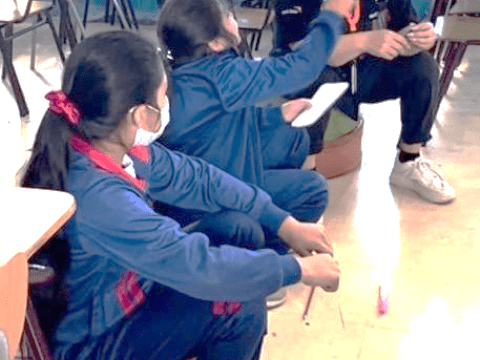What can we learn from the Catch Up Programme in Northern Chile?

By Janelle Zwier, Senior Advisor for Basic and Non Formal Education at World Vision International and Claire Hedges, Manager of the Center for the Study of Global Development, The Open University UK
Children on the move. Climate-related education disruption. Learning loss due to COVID-19. Weak foundational learning. Conflict and crisis. The current landscape of education challenges us to rapidly adapt and learn.
World Vision began its Catch Up Programme in response to this evolving landscape.
‘CUP’ is a targeted, community-based intervention, applying play-based, teaching at the right level approach to support most vulnerable children aged 6-10 to recover lost learning and return to education at the level that suits their age, and aligns to the RAPID framework and INEE principles for Catch Up.
By rapidly deploying a suite of technical resources, the intent of World Vision’s Catch Up Programme is to provide principled guidance and flexible tools to enable adoption and adaptation in country programs across multiple contexts.
World Vision Chile saw CUP as a potential response to the emergency education needs of migrant children in temporary learning spaces and schools. The programme started in Northern Chile in May 2023 in partnership with the Ministry of Social Development and UNICEF. CUP addresses the specific needs of children as they await spaces in schools or have been placed in school at a grade based on their age, regardless of their educational background. This includes children who have been moving with their families across borders, many of whom missed out on years of education, along with children in host schools with gaps in literacy or numeracy skills.
Most children participating in CUP in school have made rapid gains in basic literacy and numeracy skills, with the support of dedicated teachers hired for the Catch up programme. After 16 sessions, 88% of children that attended had progressed to their next level of literacy skill (letters, words, short passage, basic comprehension). CUP teachers, class teachers and children themselves attribute their progress to having a space that focuses upon their social emotional needs, builds their confidence and has a focus on the specific literacy and numeracy skills they need to catch up on. However, since CUP was introduced midway through the school year, allocating time during school hours has been a challenge, while some children who need to access transport or are needed at home do not consistently attend after school sessions. Schools with leaders that champion CUP find ways to overcome scheduling obstacles and reach out to parents so children attend CUP sessions.
The Catch Up Programme in Northern Chile is part of World Vision’s multi- country, scaling and evidence building research project conducted in partnership with the Open University of the UK’s Centre for the Study of Global Development. The research includes CUP projects in Zimbabwe and Ethiopia and in other contexts such as the Philippines, Lebanon and El Salvador.
This study explores questions including:
- How is CUP being adapted in different contexts (fragile, humanitarian, development)?
- What are the barriers and enablers of quality scale-up of accelerated and catch up learning opportunities for highly marginalized children in different contexts?
- What are the benefits and results for children? Are we reaching the children who need this most?
- Does CUP contribute to local systems strengthening? How?
Early findings indicate that the CUP is highly relevant across numerous contexts and a focus on catch up principles, simple assessment and structured teaching and learning tools enable adaptation with quality. Key challenges include the constraints of formal education systems to unlock time and space, particularly for in-school catch up; whereas community spaces are more flexible and reach more vulnerable children including those outside the school system. Investment in the capacity of community facilitators is key to quality. All contexts have grappled with engaging parents/caregivers in children’s learning and adapting CUP for older children who also require targeted support.
Findings from the multi-country study will be available by September 2024.
______________________________________________________________________________________________
Join us for a panel featuring World Vision Chile’s Experience in integrating migrant children and youth in education.
Accelerated Education as a catalyst for migrant and refugee integration in Latin America
Thu, March 14, 9:30 to 11:00am, Hyatt Regency Miami, Floor: Terrace Level, Brickell South